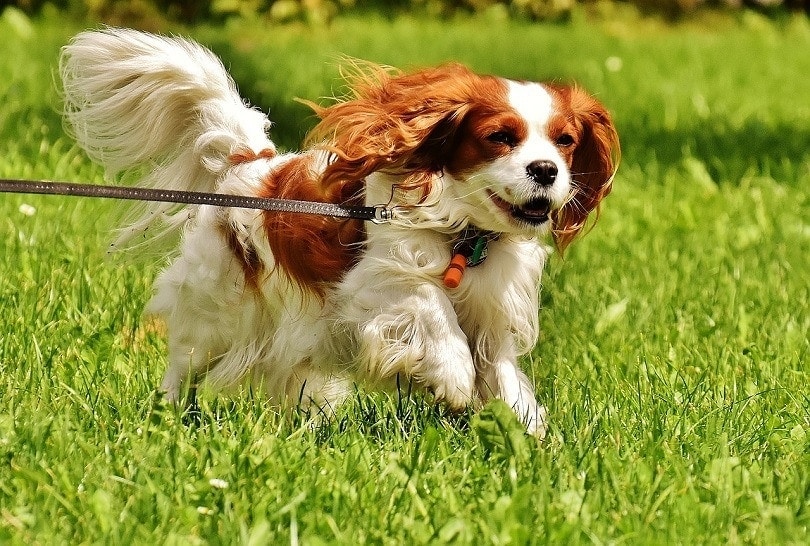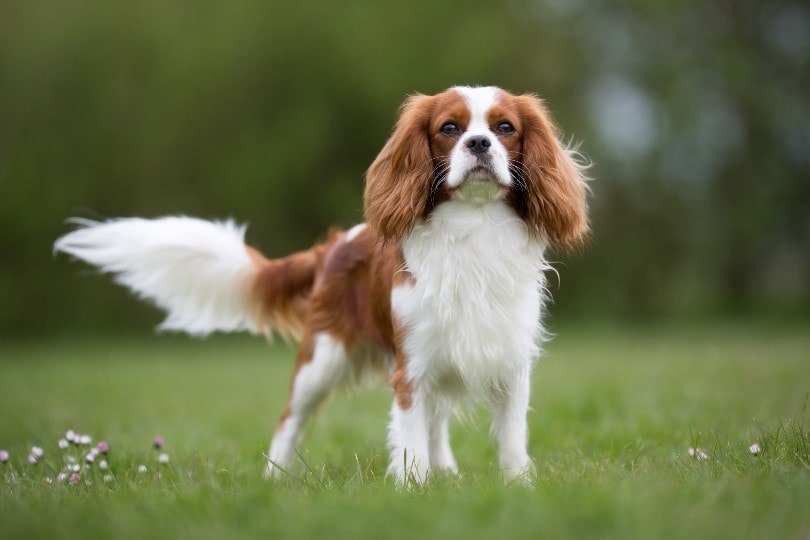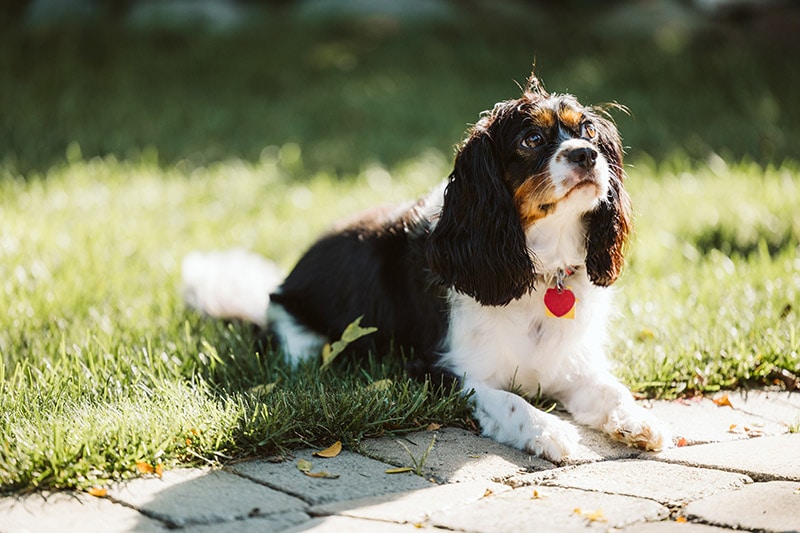The Pros & Cons of Owning a Cavalier King Charles Spaniel
Updated on

Click to Skip Ahead
The Cavalier King Charles Spaniel is a British toy dog breed developed originally to warm laps in drafty castles. Though this breed has come a long way from its humble beginnings, it’s still very much a lap dog to this day. This solidly built small breed is characterized by its silky and slightly wavy medium-length coat. Its drop ears and long tail are also distinguishing features.
If you’re interested in potentially welcoming one of these unique dogs into your home, you should familiarize yourself with the breed a bit more. There are several pros and cons of adopting a Cavalier King Charles Spaniel, so it’s best to brush up on your knowledge before you start researching breeders.
Keep reading to find the pros and cons of this beautiful British-born breed.
Pros of a Cavalier King Charles Spaniel

1. They Have Fantastic Personalities
The Cavalier King Charles Spaniel is a highly affectionate, playful, and eager-to-please breed. They are great with children of all ages and get along swimmingly with other dogs. Despite their small size, this breed is unafraid of socializing with dogs much bigger than themselves.
These dogs are curious and playful. But, at the same time, they also enjoy a good snuggle on the couch. So the Cavalier King Charles Spaniel can be just as good of a playmate for your kids as a companion or lap dog for a senior or ill person.
2. They Make Great Apartment Dogs
Some dog breeds do not do well in small homes or apartments, but this is not true of the Cavalier King Charles Spaniel. This breed is pretty low maintenance in terms of exercise needs and space requirements. Though they are considered a large-sized toy breed, they don’t take up nearly as much space as other dogs.
3. They Are Quiet
Cavalier King Charles Spaniels don’t bark nearly as much as other dog breeds. So when a stranger comes into your home, this breed is much more likely to respond with tail wags and curious licks than loud, curious barks. This is just another reason why they’d make an excellent dog for apartment dwellers or those who have irritable neighbors who will complain about every little thing.
4. They Are Very Intelligent
Cavalier King Charles Spaniels are a highly intelligent and capable breed. They can pick up agility skills quickly and are rather easy to train when you want them to learn a specific behavior. In addition, they have a deeply rooted drive to keep their humans happy, so most Cavalier owners find their pups to be quick learners.
5. They Have Moderate Exercise Needs
This breed is an ideal companion for people who don’t have a lot of time in their day to devote to exercise. The Cavalier King Charles Spaniel needs around an hour of exercise a day, but this doesn’t need to be super high-intensity. You can split this hour into two half-hour walks to make it more manageable. Because they don’t have extremely high energy levels, you don’t have to take them for long walks or let them run off-leash for hours to burn off steam.
You might also consider signing up your pup for agility training as a way of getting its exercise in.
Cons of a Cavalier King Charles Spaniel

1. They Are Prone to Health Problems
Several hereditary conditions are common in the Cavalier King Charles Spaniel. However, the biggest killer of this breed is an inherited heart disease that shares many symptoms of the human form of mitral valve disease. This condition is 20 times more prevalent in the Cavalier King Charles Spaniel than in any other breed. Some estimates suggest that up to 50% of all Cavaliers will develop this condition.
This breed is also prone to eye conditions like cataracts and retinal problems, patella luxation, hip dysplasia, and syringomyelia. Syringomyelia is a condition in which fluid-filled cysts form within the spinal cord, causing neuropathic pain, phantom scratching, and intermittent pain.
2. They Need Regular Grooms
Though this breed is low maintenance in exercise, they need regular grooming to keep their coats looking sleek and beautiful. Unfortunately, skimping out on these essential grooms can cause matting and build-up of bacteria in the ears. The good news is that much of this grooming can be tackled at home, but you need to stay on top of it.
3. They Don’t Like to Be Alone
If you’re away a lot for work or travel, a Cavalier King Charles Spaniel may not be the best breed for you. These dogs love company, are very dependent, and can’t handle being left alone for long. If you are gone too many hours of the day, your pup can get separation anxiety, leading to destructive chewing or excessive barking.
Of course, if you have your heart set on this breed, you could always hire a dog sitter or walker to keep your pup company while you’re away. Keep in mind, however, that these services will add up fast and will be very pricey if it’s something you need to use every day.
4. They Don’t Make a Great Guard Dog
Because of their small size, Cavalier King Charles Spaniels will not make the best guard dog. They are unlikely to scare anyone away, mainly because they’ll be curious about intruders and won’t respond with barks when they enter the home. However, this breed doesn’t discriminate. They will walk up happily to an intruder and expect pets and attention.
5. They’re Expensive
The initial costs of adopting a Cavalier King Charles Spaniel can get pricey. But, of course, it depends on where you’re getting your dog from. Most professional breeders will sell their puppies for $800 to $2,500, but you may luck out and find one at your local adoption center.
Final Thoughts
The Cavalier King Charles Spaniel is a beautiful dog breed with a lot to offer it is owners. However, the biggest drawback of this breed is its propensity toward health problems. If you do decide to adopt one, we recommend investing in pet insurance in case your pup runs into health issues. Having insurance to fall back on in the face of expensive vet bills will help alleviate your financial stress while ensuring your dog gets the medical attention it needs when it needs it.
Read Also:
- 10 Helpful Tips on How to Potty Train a Cavalier King Charles Spaniel
- Cavalier King Charles Spaniel vs King Charles Spaniel: How Are They Different?
Featured Image Credit: Alexas_Fotos, Pixabay











